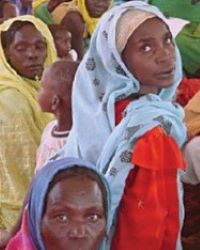Kimr in Sudan

Photo Source:
Frontiers
|
Send Joshua Project a map of this people group.
|
| People Name: | Kimr |
| Country: | Sudan |
| 10/40 Window: | Yes |
| Population: | 200,000 |
| World Population: | 200,000 |
| Primary Language: | Tama (Chad) |
| Primary Religion: | Islam |
| Christian Adherents: | 0.00 % |
| Evangelicals: | 0.00 % |
| Scripture: | Translation Started |
| Ministry Resources: | No |
| Jesus Film: | No |
| Audio Recordings: | Yes |
| People Cluster: | Ouaddai-Fur |
| Affinity Bloc: | Sub-Saharan Peoples |
| Progress Level: |
|
Introduction / History
The Kimr people are a tribe belonging to a larger group known as the Tama. This larger group is concentrated along the Chad/Sudan border and is made up of several ethnic groups including the Abu Sharib, the Kibet, the ararit, the Kimr, the Sungor, the Erenga, and the Tama.
They all speak dialects of the Tama language; however, many also speak Arabic as a trade language.
These tribes live very similarly to one another. They live in similar regions (sandy, hilly), grow similar crops, build similar homes, and share similar cultures and lifestyles.
What Are Their Lives Like?
The Kimr (Tama) make their living by farming and raising cattle, though a few Tama tribes are non-nomadic shepherds. These settled tribes also plant small gardens, with crops including millet, sorghum, sesame, peanuts, okra, onions, chilies, watermelons and other vegetables. The Tama keep livestock including camels, cattle, goats, and sheep, from which they get wool, leather, and dairy products.
Their diet consists mainly of millet with sauce, goat meat, okra, and onions, though they occasionally hunt for meat (guinea, fowl, and gazelles).
In Kimr society, the men mainly do the field work, trade at local markets, and work as craftsmen, while the women do various other jobs. During the rainy season, women gather wild grass, berries, honey, and other materials from the forests. They also help the men in the fields, make baskets, produce pottery, and brew beer from millet, which they either keep for their family or sell for profit.
The Kimr people make their homes of reed mats and cone-shaped, thatched roofs. They are round structures and range from about 15-20 feet in diameter, and some have low, narrow entrances to keep out wild animals such as lions and hyenas. The people live together in village compounds, and each settlement has its own leader, or chief, who provides advice, settles disputes, and is responsible for making important decisions. The village chief is accountable to a territorial chief, and the territorial chief is then accountable to an even higher government leader.
What Are Their Beliefs?
The Tama tribes are all Muslim and practice Islamic traditions, holidays and celebrations; however, many also practice animism and witchcraft alongside Islam.
What Are Their Needs?
Because of the harsh climate of the desert region, the lack of natural resources, and the poor economy, many leave their home territory and move elsewhere in search of work and a better life. Many end up in the Nile Valley, and often work as clerks, teachers, drivers, tailors, or automobile mechanics.
In most regions where the Tama live, education is not readily available. The schools that do exist are Islamic schools that are attended only by the boys. Because of this, illiteracy among the people is very high, though some Tama can afford to send their children abroad to attend school.
Educators and English teachers would be able to provide valuable service for these Muslims.
Those with skills in water purification and treatment could provide help and better health to this people group living in the dry climates of Sudan.
Because of the poor natural resources in the country, those who could market Kimr goods to a wider audience could provide economic help to these people.
Prayer Points
Ask the Lord to send forth laborers into Sudan to share the love of Jesus with the Kimr.
Ask the Holy Spirit to send dreams of the risen Christ to Kimr family leaders to open the door to the gospel.
Pray that God will open the hearts of Sudan's governmental leaders to the gospel.
Ask the Lord to save key leaders among the Kimr who will boldly declare the gospel.